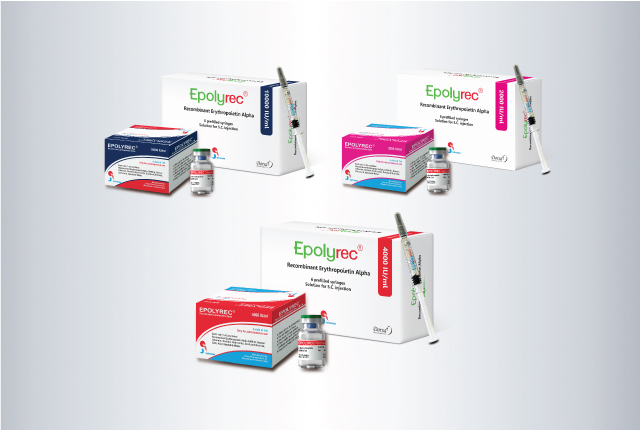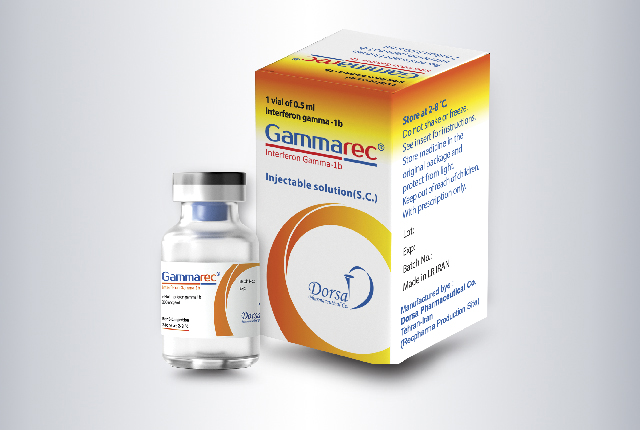Epolyrec®
Here is a summary of the information about Epolyrec®. If there is anything you do not understand, please ask your doctor or pharmacist to explain it to you.
- Keep out of the reach of children.
- Do not use after the expiry date printed on the label.
- FDA pregnancy category: B3
- Rx only.
- Do not throw away any medicines via wastewater or household waste. Ask your pharmacist how to throw away medicines you no longer use.
Gerenal information
Patient Information
Epolyrec® contains the active substance epoetin alfa (Recombinant), a protein that stimulates the bone marrow to produce more red blood cells which carry haemoglobin (a substance that transports oxygen). Epolyrec® is a copy of the human protein erythropoietin (ee-rith-roe-po-eh-tin) and acts in the same way. If you have kidney disease, you may be short of red blood cells if your kidney does not produce enough erythropoietin (necessary for red cell production). Epolyrec® is prescribed to stimulate your bone marrow to produce more red blood cells.
What Epolyrec® is used for:
- Treat symptomatic anaemia caused by kidney disease in children on haemodialysis, in adults on haemodialysis or peritoneal dialysis, in severely anaemic adults not yet undergoing dialysis.
- Treat anaemia in adults receiving chemotherapy for solid tumours, malignant lymphoma or multiple myeloma (bone marrow cancer) who may have a need for a blood transfusion. Epolyrec® can reduce the need for a blood transfusion in these patients.
- Moderately anaemic adults who donate some of their blood before surgery, so that it can be given back to them during or after the operation. Because Epolyrec® stimulates the production of red blood cells, doctors can take more blood from these people.
- Moderately anaemic adults about to have major orthopaedic surgery (for example hip or knee replacement operations), to reduce the potential need for blood transfusions.
- Treat anaemia in adults with a bone marrow disorder that causes a severe disruption in the creation of blood cells (myelodysplastic syndromes). Epolyrec® can reduce the need for a blood transfusion.
Tell your doctor or pharmacist before using Epolyrec® if :
- You know you suffer, or have suffered, from high blood pressure; epileptic seizures or fits, liver disease, anaemia from other causes, porphyria , an allergy to latex.
- You are a patient with chronic renal failure, and particularly if you do not respond properly to Epolyrec®.
- You are a cancer patient.
- You develop a serious rash or another of these skin symptoms.
Know all the medicines you take. Keep a list of them with you to show your doctor and pharmacist.
Who should not take Epolyrec®:
- If you are allergic to epoetin alfa or any of the other ingredients of this medicine
- If you have been diagnosed with Pure Red Cell Aplasia after previous treatment with any product that stimulates red blood cell production (including Epolyrec®).
- If you have high blood pressure not properly controlled with medicines.
- To stimulate the production of your red blood cells (so that doctors can take more blood from
you) if you cannot have transfusions with your own blood during or after surgery.
- If you are due to have major elective orthopaedic surgery (such as hip or knee surgery), and
you have severe heart disease, have severe disorders of the veins and arteries, have recently had a heart attack or stroke
- If you can’t take medicines that prevent blood clotting.
How to take your Epolyrec®:
- Always use this medicine exactly as your doctor has told you. Check with your doctor if you are not sure.
- Epolyrec® may be given by injection either intravenously or subcutaneously.
- Your doctor will decide how Epolyrec® will be injected.
- The dose of Epolyrec® you receive is based on your bodyweight in kilograms. The cause of your anaemia is also a factor in your doctor deciding the correct dose.
- Your doctor will monitor your blood pressure regularly while you are using Epolyrec®.
- Do not attempt to inject yourself unless you have been trained to do so by your doctor or
- Always use Epolyrec® exactly as instructed by your doctor or nurse.
- Only use Epolyrec® if it has been stored correctly.
- Before use, leave the Epolyrec® to stand until it reaches room temperature. This usually takes between 15 and 30 minutes.
- Only take one dose of Epolyrec® from each syringe.
- Do not shake Epolyrec®. Prolonged vigorous shaking may damage the product.
What to do if you have Overdosed :
Tell the doctor or nurse immediately if you think too much Epolyrec® has been injected. Side effects from an overdose of Epolyrec® are unlikely.
Side effects :
Like all medicines, this medicine can cause side effects, although not everybody gets them.
- Very common side effects:
Diarrhoea, Feeling sick in your stomach, Vomiting, Fever, Respiratory tract congestion, such as stuffy nose and sore throat, has been reported in patients with kidney disease not yet on dialysis.
- Common side effects:
Increased blood pressure, Headaches, particularly sudden, stabbing migraine-like headaches, feeling confused or having fits may be signs of a sudden increase in blood pressure. This requires urgent treatment. Raised blood pressure may require treatment with drugs (or adjustment to any drugs you already take for high blood pressure), Blood clots (including deep vein thrombosis and embolism) that may require urgent treatment.
You may have chest pain, breathlessness, and painful swelling and redness, usually in the leg as symptoms, Cough, Skin rashes, which may result from an allergic reaction, Bone or muscle pain, Flu-like symptoms
These may be more common at the start of treatment. If you have these symptoms during injection into the vein, a slower delivery of the injection may help to avoid them in the future, Redness, burning and pain at the site of injection, Swelling of the ankles, feet or fingers, Arm or leg pain
- Severe allergic reaction that may include a swollen face, lips, mouth, tongue or throat,difficulty swallowing or breathing, itchy rash (hives)
- Problem with the blood that may cause pain, dark coloured urine or increased sensitivity of the
skin to sunlight (porphyria) If you are receiving haemodialysis:
- Blood clots (thrombosis) may form in your dialysis shunt. This is more likely if you have low
blood pressure or if your fistula has complications.
- Blood clots may also form in your haemodialysis system. Your doctor may decide to increase
your heparin dose during dialysis.
Reporting of side effects:
If you get any side effects, talk to your doctor, pharmacist or nurse. This includes any possible side effects not listed here.
You can also report side effects directly via the Yellow Card Scheme at: www.dorsapharma.com/ (ADR form)
By reporting side effects, you can help provide more information on the safety of this medicine.
Product specification
| Generic name | Erythropoetin Alpha |
| Trade name | Epolyrec® |
| Dosage form | 1000 & 2000 & 4000 I.U sterile colorless clear solution for injection in 1ml vial or 0.3ml PFS |
| Category | Antianemic preparations |
| ATC code | B03XA01 |
| Package | • Box of 6’s 1 ml Vials • Box of 6’s 1 ml PFSs |
| Active ingredient | Ricombinant human Erythropoetin Alpha |
| Storage | Refrigerated (Between 2-8°C). Protect from frozen. |
| Shelf life | 24 Months |

